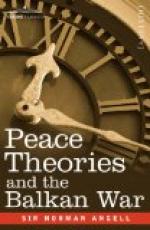CHAPTER I.
THE QUESTIONS AND THEIR ANSWER.
What has Pacifism, Old or New, to say now?
Is War impossible?
Is it unlikely?
Is it futile?
Is not force a remedy, and at times the only remedy?
Could any remedy have been devised on the whole so conclusive and complete as that used by the Balkan peoples?
Have not the Balkan peoples redeemed War from the charges too readily brought against it as simply an instrument of barbarism?
Have questions of profit and loss, economic considerations, anything whatever to do with this war?
Would the demonstration of its economic futility have kept the peace?
Are theories and logic of the slightest use, since force alone can determine the issue?
Is not war therefore inevitable, and must we not prepare diligently for it? I will answer all these questions quite simply and directly without casuistry and logic-chopping, and honestly desiring to avoid paradox and “cleverness.” And these quite simple answers will not be in contradiction with anything that I have written, nor will they invalidate any of the principles I have attempted to explain.
And my answers may be summarised thus:—
(1) This war has justified both the Old Pacifism and the New. By universal admission events have proved that the Pacifists who opposed the Crimean War were right and their opponents wrong. Had public opinion given more consideration to those Pacifist principles, this country would not have “backed the wrong horse,” and this war, two wars which have preceded it, and many of the abominations of which the Balkan peninsular has been the scene during the last 60 years might have been avoided, and in any case Great Britain would not now carry upon her shoulders the responsibility of having during half a century supported the Turk against the Christian and of having tried uselessly to prevent what has now taken place—the break-up of the Turk’s rule in Europe.
(2) War is not impossible, and no responsible Pacifist ever said it was; it is not the likelihood of war which is the illusion, but its benefits.
(3) It is likely or unlikely according as the parties to a dispute are guided by wisdom or folly.
(4) It is futile; and force is no remedy.
(5) Its futility is proven by the war waged daily by the Turks as conquerors, during the last 400 years. And because the Balkan peoples have chosen the less evil of two kinds of war, and will use their victory to bring a system based on force and conquest to an end, we who do not believe in force and conquest rejoice in their action, and believe it will achieve immense benefits. But if instead of using their victory to eliminate force, they in their turn pin their faith to it, continue to use it the one against the other, exploiting by its means the populations they rule, and become not the organisers of social co-operation among the Balkan populations, but merely, like the Turks, their conquerors and “owners,” then they in their turn will share the fate of the Turk.




